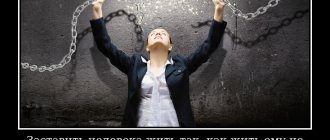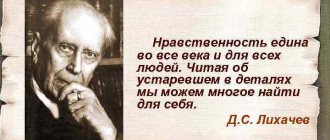The main condition for victory is fight
Don't lose the will to win when you suffer one defeat after another. And success will certainly overtake you.
- There will be a new dawn, there will be many victories. And never believe that there is no way out
- Victories can please the naive. And defeats are for the wise
- In your exhausting quest for victory, remember that if you give up, it won’t get easier
- To defeat a strong opponent, you need to take actions that the enemy will no longer understand
- Even before the start of the fight, choose only victory for yourself. And then no one can resist you
- The road to victory is a series of small achievements accomplished every day
- The desire to celebrate victory without making any effort is similar to the desire to reap a harvest in an unsown field.
- Victory is not final. Failure is not a fatal mistake. And only courage matters
- People love the show. And those who today applaud your triumph will later rejoice at your execution
- Even the winners' wounds don't hurt
- Strive to win with ingenuity and intelligence rather than resistance
- The ability to persuade is more worthy of honor than victory over an opponent
- Every time you try to do something on the way to your goal, you make another hole in the wall behind which it is hidden
- If a defeated opponent smiles, he significantly spoils the winner's taste of triumph
- Easy things that you put off and didn't do when needed later turn into hard work.
- In order not to become discouraged by the still distant victory, do not estimate how much remains to be done. Better be inspired by how much has already been accomplished
- Everything you have in life now, you either deserved or allowed it to happen.
- As long as you still have a chance, you haven't lost
- The winner always gets up one more time than he falls.
- If you fall face down in the mud, get up and convince everyone that it was healing
- When you feel like giving up, remind yourself why you started all this.
Quotes about the war of great people
They dreamed of finishing off the beast and its den. And they finished it off!
Farewell, beloved city! We're going to sea tomorrow.
Defend every inch of Soviet land, fight to the last drop of blood! I.V. Stalin
All the same, I know one thing for sure: we will win in this attack!
This banner is victory and strength - it will protect Leningrad from the enemy, it will win over the enemy’s grave - there will be a day! - it will make a noise all over the world!
In heaven, on earth and at sea!
“You have to be a very brave person to be a coward in the Red Army. Stalin"
There is no land for us beyond the Volga. Vasily Zaitsev (Battle of Stalingrad 1942)
We are in Berlin! (Inscriptions on the walls of houses in 1945)
Russia is great, but there is nowhere to retreat - Moscow is behind us! Vasily Klochkov
Order: “Forward!” Command: “Stand up!” Nikolay Starshinov
Let's repeat the feat of Alexander Matrosov.
Comrade Red Army soldier! Quickly free our village from the Germans!
Our cause is just, the enemy will be defeated, victory will be ours. V. M. Molotov
Comrade Red Army soldier! Quickly free our village from the Germans!
Stalin's falcons. (about pilots) Novikov
Do as I do!
Comrades! Citizens! Brothers and sisters! Soldiers of our Army and Navy! I am turning to you, my friends! I.V. Stalin
Our land is famous for its heroes.
You will never win a single victory if you fear defeat
Statuses about victory in life will tell your friends about your achievements and encourage them to take bold actions.
- Victory is as much a choice as defeat. Whether you win or lose is up to you to decide.
- Victory in itself cannot make you stronger. Fighting failures, overcoming obstacles - these are the conditions for building your strength
- Many people give up, not knowing that there is only one step left to victory. And someone else will take this step for you
- Victory over someone weaker than you is like defeat
- Victories that come too easily are worth little
- You will achieve your goal if you know how to move without losing enthusiasm from failures
- On the path to triumph, it is worth remembering that it is hard when the road goes up.
- Sometimes, in order to win, you need to be not smarter than your opponent, but a day faster than him
- The victory of conscience in a person is called truth
- It is much more honorable to defeat a brave opponent than a coward.
- It's not easy to defeat someone who readily exposes his chest to a blow.
- In an effort to win, try to follow the rule: strike not at the last moment, but as soon as the opportunity arises
- Even in order to move a mountain, you need to drag small pebbles for a long time and patiently
- On the path to a better life, choose as travel companions only those who can pull you higher
- The loser is not the one who did not have a chance, but the one who fails to take advantage of it in time
- If you think a goal is unattainable, just change your plan to achieve it.
- Play sports. Sports achievements will help you achieve other goals
- If you want to become a winner, don't wait for the right conditions - they will never come. Just take action now
- Strive to rise to the top not so that the world can see you, but so that you can see the world yourself
- If you can’t find the key to victory, then at least remember that the key to failure is the desire to please everyone
- Take risks. Even if you lose, you will gain wisdom
From peace to war
Do you still remember the saying “if only there was no war”? For residents of the late USSR, these words were almost the highest value, a sufficient reason to endure any hardship, humiliation, or injustice. Being at the peak of its power after World War II, the USSR did not wage wars of conquest and did not seek to annex new territories.
Yes, he got involved in almost every mess on the planet with money, weapons, military advisers, and in Afghanistan with an army of 140,000, but he never specifically advertised this and carefully draped his participation in wars with neutral euphemisms: assistance to the fraternal people, international duty , limited contingent of troops and so on. Anything, just so that the terrible word “war” does not sound.
This is so inconsistent with the cannibalistic image of the USSR, forged by Stalin in the Gulag camps, and is so different from the situation in the modern post-Soviet space, literally covered with “hot spots” of local conflicts and internecine wars, that you are simply amazed how we were able to do so in such a short period of time degrade so much, and the peoples who went shoulder to shoulder through the Second World War will fight each other.
Russia has gone further than others in this: in addition to peacekeeping missions, it has accounted for two bloody Chechen wars, a war with Georgia, then a war with Ukraine (the annexation of Crimea and the creation of two enclaves), participation in the Syrian adventure, and, on top of that, confrontation with all civilized world, hysterical attempts to scare him with cartoons with a new “wunderwaffe” and even what was previously simply unthinkable - direct clashes with NATO forces in Syria, that is, the shortest path to World War III.
These are colossal changes for a country that only recently (by historical standards) declared its commitment to peace and disarmament.
We already see the consequences of these changes every day, but their essence is not so obvious. Nevertheless, there is exactly one day a year when the shifts that have taken place in the mass consciousness of Russians are clearly manifested. When they can be examined in all the unsightly details, as if under a microscope. When the attitude towards war and peace becomes the main agenda for the entire country. Of course, this day is May 9th. Victory Day.
The first radical change affected the holiday itself.
Once upon a time, Victory Day was a holiday of peace, but now it is increasingly turning into a holiday of war.
In Soviet ideology, war was the embodiment of horror: destroyed cities, burned villages, destroyed industry; people who were taken prisoner or ended up in concentration camps; millions died in battle, under bombing, from hunger and disease, or simply maimed; children who lost their parents and grew up in orphanages.
Now the war is gradually turning into some distant and semi-mythical “time of heroes”: strong, brave, selflessly devoted to the Motherland and to a wise, albeit stern leader. Be sure to be hung with medals, covered in glory, enjoying universal respect and instilling fear in their enemies. How can you not want to become just like them? And now war is sexy.
Compare the Soviet “holiday with tears in our eyes” with the modern glossy picture of a rollicking carnival. The Soviet version of the holiday formed a negative attitude towards war, while the modern one carefully avoids its horrors and focuses more on victories and exploits, like a rogue salesman, exaggerating the advantages and hiding the shortcomings of the product he wants to impose on us.
The content of the concept of “victory” has radically changed.
For those who survived the war, victory first of all meant that there was no more need to die and kill, no more need to lose loved ones and friends, that one could finally return to normal life - to family and creative work.
For those who have formed an idea of war from patriotic textbooks and films, victory is rather a self-gratifying indicator that we are stronger and better than others, a reason for pride and an indicator of superiority. It’s as if we won not the war, but the overall medal standings in the Great Patriotic Olympiad.
When the content of an event changes, both the attitude towards it and its visual symbols change. The Soviet image of victory is conveyed by strict, laconic, alarming red and black posters. Silhouette of a soldier, flames, a star, a red banner and a short inscription: “In the name of life”, “Eternal glory to the heroes”, “The feat of the fathers is immortal”.
The image of victory from our days is already painted in much more positive tones, and the place of flames and stars is sometimes taken by cute little flowers.
Looking at this poster, one gets the impression that winning is good, winning is fun, winning is easy, winning is beautiful.
Pain, blood, death and suffering of millions of people remain somewhere far, far away, at the very edge of consciousness.
Recently I came across a scan of a very interesting brochure from the Political Directorate of the Leningrad Front, published in 1945. Its name was simple: “Slogans for the Victory Day.” And the content is appropriate - exactly eight ideologically verified slogans, one per page. Here they are:
- Long Live the Victory!
- Long live the day of national celebration - the great Victory Day!
- Glory to the wise inspirer and organizer of the world-historical victory, the Great Stalin!
- Long live the victorious heroic Red Army!
- Glory to the Soviet troops, who completed the complete defeat of the German imperialists!
- Glory to our great Motherland!
- Long live the party of Lenin-Stalin - the inspirer and organizer of the great victory over the Nazi invaders!
- Long live the great Soviet people, who defended their fatherland from the Nazi invaders!
Their style clearly contrasts with what is popular now and appears on stickers, posters, advertising posters and in Internet memes: “We can repeat it”, “To Berlin”, “We remember, we are proud”, “Thanks to grandfather for the victory”, “ We are the heirs of a great victory,” “The great victory is in each of us.”
The focus of modern slogans has shifted from victorious warriors to the authors/consumers of these same slogans.
Not “Glory to the Soviet troops, party, people, and so on,” but “we remember,” “we are proud.” What are you proud of? You yourself, apart from this slogan, have done nothing, you have not defeated anyone.
Even more ego, “The great victory is in each of us.” Did your great-grandfather, killed in the first battle and lying somewhere in the swamps near Rzhev, make you better, kinder, smarter or braver? No, you just got the life you are living now.
Differences also appeared in the name of the holiday: “Great Victory Day” in 1945 and “Great Victory Day” now. At first glance, there is no difference - just one word has changed its place. And, at the same time, it changed the whole meaning of the event: the enormous relief that the war was over turned into an unclouded joy from a tremendous success.
Stalin had reasons not to call the Victory great. The Germans reached Moscow despite all the bravado of the pre-war years from the series “we will beat the enemy on his territory” and intelligence warnings, and the losses of the defeated German troops were two times lower than the Soviet ones. Civilian casualties are almost four times lower. Overwhelming the enemy with mountains of your corpses is more of a tragedy than a great achievement.
The brightest, most dangerous, unofficial, but very popular slogan “we can repeat” requires special mention. No we can not. A full-scale Russia-NATO conflict will end in a global nuclear disaster, so there will be no winners.
There will be no one to ride home with his legs torn off in a freight car, playing songs of the war years on the accordion.
And, in general, there will be nowhere to go.
Amazingly, when this slogan appeared, it did not cause any shock, indignation, or rejection among the majority of the population, because the inhabitants of the USSR received a powerful vaccination against war. The colossal human losses, the shock of the first period of the war, when the Red Army retreated in disarray, losing equipment and being surrounded, the ruins of cities and cripples with severed limbs appearing on the streets after the war for a long time discouraged the Soviet people from repeating this, and the ideology had to correspond to this .
The slogans “Bury the sword of war”, “Forget the word war”, “We defended the world - we will defend the world”, “Peace to the world” and so on became firmly established in Soviet official rhetoric.
Now we are no longer afraid of war, but on the contrary, we scare the West with it.
We no longer say that we are going to protect the world, no. We are demonstrating in every possible way our readiness to attack and carry out an extended version of nuclear suicide. Otherwise, why is there a need for a demonstration of the “Doomsday Weapon” during the President’s annual address to the Federal Assembly?
Russia had no allies left and the “struggle for peace” gradually degenerated into an unequal struggle with the whole world , and arms reduction into a vain attempt to create a new miracle weapon with an “unpredictable trajectory” and a completely predictable result.
The country is actually going back several decades, to the period of the Cold War and the arms race. True, this time the Russian Federation does not have the scientific or industrial base to participate in it, nor the funds for anything more dangerous than cartoons with warheads falling on Florida, or hacker attacks.
An interesting metamorphosis occurred with the role of children at the Victory Day. The ideology of the USSR assigned an important place to them: children in the subjects of Soviet posters give meaning to all the sacrifices made for the sake of Victory. The world, won at great cost, is meant for them.
Propaganda promised their children everything that the Soviet people never had (and never will have).
A new, different, better life. Calm, safe and happy.
Now the official ideology has failed to create an attractive image of the future for the residents of the Russian Federation. Turning the country into an appendage to an oil pipeline is an obvious dead end. In such a country, our children will definitely not live better than us. Few people realize this clearly and clearly, but a much larger number of people feel it on a subconscious level.
When the path to a happy future is closed, people strive for a happy past. For example, at a time when the troubles ended, when our country established its dominance over half the world, when everything was simple and clear, when we were winners - on May 9, 1945.
Of course, these ideas are just as false as the dummies of military awards at children’s gymnasiums, but perhaps this is one of the reasons why mothers willingly dress their children in military uniforms, instead of trying to protect them from this.
By the way, I’m not sure that veterans who went through the war would be pleased to see their grandchildren in the very uniform in which hastily prepared and poorly armed Soviet soldiers were thrown over and over again into a hopeless attack on yet another nameless height until the German machine gunners began to withdraw crazy about the number of people killed. Or see on children’s uniforms insignia and medals (usually “For Courage”), which veterans received not in a supermarket, but on the battlefield, and paid for them not with plastic, but with blood. However, I am not a veteran and I can only assume this.
During the festive victory carnival, children literally from the cradle try on the role of a war hero. The Motherland loves heroes: they will always find a use in the next hot spot thousands of kilometers from home, so cannon fodder is a hot commodity. And inexpensive: when a hero’s arms, legs or head are torn off, the Motherland instantly turns into a state and shows him or his relatives a heavy fig instead of treatment, a decent pension, or at least a decent funeral.
High-quality cannon fodder must be prepared from childhood, like Olympic champions, until perception is uncritical and the underlying attitudes are perceived as one’s own values.
I understand the state’s interest in this process, but I can only explain the participation of parents in it as frivolity.
Apparently, even the Soviet Union, militarized to the limit, was more humane in its treatment of children than modern Russia.
I don’t remember that during the Soviet era, Victory Day was celebrated with such pomp. Budgets for festive events are growing, pathos is becoming more and more, and the celebration scenario itself is becoming more and more complex, including new paraphernalia and rituals. From a certain point this began to become a problem.
Many people do not like the “Immortal Regiment”, which has already firmly entered the canon of the celebration. For some, the mass of photographs of dead people evokes associations with a cemetery, others are outraged by the fact that many carry portraits of absolutely random people about whom they know nothing, others are trying to include an alternative in the canon - “The Immortal Barracks”.
Others are annoyed by the Guards (“Colorado”, “St. George”) ribbons sticking out of all the cracks and lying in every ballot box.
Still others are enraged by car stickers “To Berlin”, “Trophy”, “We can repeat”, which look especially stupid on German and Japanese cars.
Someone else is outraged that huge amounts of money are spent on holiday decorations and other nonsense, while the last veterans live out their days in abject poverty.
A significant number of people have a negative attitude towards young people dressed in field uniforms; those dressed in NKVD uniforms are especially irritated. Children in military uniform are a separate reason for discussion.
This list can be continued almost indefinitely, but the essence of it all is the same: Victory Day is now celebrated overwhelmingly by those who did not experience this war and rely only on their ideas about it, and they can be very different. Depending on age and political beliefs, people may have completely different views on the outcome of the war, the role of Stalin, relations with the allies, with Nazi Germany before 1939, with the peoples of the former USSR and a host of other things.
And when all this, fueled by a powerful federal advertising campaign across all information channels, spills out, the result is a flammable mixture worse than any Molotov cocktail. From all sides there are mutual accusations of betrayal, victory, disrespect for the memory of the victors, inciting military hysteria, and so on.
The holiday now unites not the entire nation, but some groups of citizens against others.
The reversal in attitude towards war that has taken place is, in fact, not a new phenomenon in history. After the defeat in World War I, Germany experienced approximately the same thing as many people born in the USSR after defeat in the Cold War and the collapse of the country: an oppressive feeling of frustration, disappointment, anger, fear and a thirst for revenge.
And the methods by which propaganda pushed society towards a new war were exactly the same as those used now in Russia: creating images of external and internal enemies, introducing the idea of one’s exclusivity and national superiority, stories about miracle weapons and many, many lies.
We know how it ended for Germany. Rising from our knees, unleashing the Second World War, genocide, and then defeat in the war, that is, our victory. Now we are confidently following in the footsteps of Germany in 1933, and although Russia, as a nuclear power, is unlikely to face military defeat, political and economic defeat is easy.
History severely punishes those who forget it, try to distort it or embellish it to manipulate people. Those who use even the brightest moments to awaken dark instincts in people.
Turning the day of our past victory into a war holiday is another step towards our future defeat.
PS Discussion of the article on facebook.
The greatest achievement is to overcome your negative thinking.
Statuses about defeating yourself will tell you that the most valuable achievement is changing yourself for the better.
- Victory does not always mean first place on the podium. Sometimes it means that you are better than you were
- Sooner or later, the one who is confident in it will win
- Winning shows what you can achieve. And defeat - what are you really worth?
- He who defeats himself can win thousands of battles
- Mistakes and failures only enhance the taste of victory and make it brighter
- You will win when your desire for it becomes stronger than your fears
- On the way to your cherished goal, do not rely on chance. Discipline is the basis of victory, and luck is the result of good preparation
- As long as a bird can fly, it doesn't matter how badly its wings are damaged. When it can no longer fly, it is no longer a bird.
- Sometimes the only way to win is surrender
- The one who resists the desire to finish off the enemy is a doubly winner
- In love battles, being a winner or a loser is equal happiness.
- Victory will be more honorable when you do not shy away from battle, but do not seek it yourself
- Even a drop wears away a stone. But not by the force applied, but by the frequency of your attempts
- Those who have achieved great success will confirm that they achieved triumph when they believed in themselves.
- If you set a course for victory, do not try to fight the wind. Better spread your sails
- You will begin to notice obstacles on the way if you take your eyes off your cherished goal
- Even on your knees you can achieve a great victory
- If you want to win, strive to overtake others and yourself
- A person's willpower is like muscles in the body: the more often you exercise it, the stronger it becomes.
- The main wealth of your life will not be your achievements, but their results.
- Strong is the one who can manage his weaknesses
Quotes about the memory of the war
We will not flinch in the battle for our capital. Our native Moscow is dear to us. With an indestructible wall, a steel defense, we will defeat and destroy the enemy.
Let's defeat the fascist raiders.
If we see that Germany is winning, then we should help Russia, and if Russia is winning, then we should help Germany, and thus let them kill as many as possible, although I do not want to see Hitler as the winner under any circumstances . Harry Truman
The Motherland is calling!
Every crumb of bread saved shortens the war!
Hit, stab, drive, take full!
Hitting an enemy is a different matter; it’s more fun with a joke. There is no letter from dear - darker thoughts.
The death of the brave.
The war is not over until the last soldier who died is buried. Dmitry Yazov
Soldier, the Motherland is waiting for this day! V. Koretsky
Wait for me, and I will return to spite all deaths. K. Simonov
We cannot forget these roads.
If I die, please consider me a communist!
Death to the fascist occupiers!







